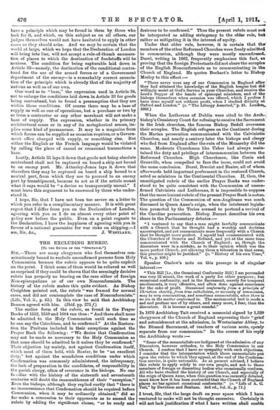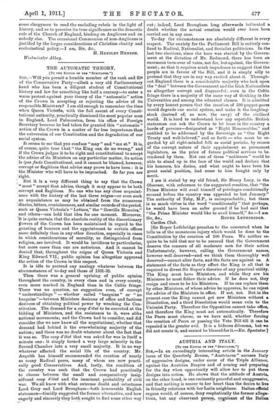THE EXCLUDING RUBRIC.
[To THE EDITOR Or THE " SPECTATOR.”]
SIR,—There are many clergymen who feel themselves con- scientiously bound to exclude unconfirmed persons from Holy Communion because the rubric appears to be quite explicit on the point. I think some of them would be relieved as well RS surprised if they could be shown that the seemingly decisive rubric has properly no bearing on the case either of foreign Non-episcopalians or of our own Nonconformists. The history of the rubric makes this quite evident. As Bishop Creighton pointed out, the rubric " was framed for normal cases, and did not contemplate the case of Nonconformists." (Life, Vol. ii., p. 63.) In this view he said that Archbishop Benson agreed with him. (Ibid. pp. 275f.)
The earlier form of the rubric, as found in the Prayer Books of 1552, 1559 and 1604 ran thus : " And there shall none be admitted to the Holy Communion until such time as he can say the Catechism, and be confirmed." At the Restora- tion the Puritans included in their exceptions against the Prayer Book the following : " We desire that Confirmation may not be made so necessary to the Holy Communion as that none should be admitted to it unless they be confirmed." Their objection lay mainly, not against Confirmation itself, which most of them held, with Baxter, to be "an excellent duty," but against the scandalous conditions under which Confirmation was commonly administered, the infrequency, the lack of preparation in the candidates, of responsibility in the parish clergy, often of reverence in the bishops. No one fa 1.iliar with the history of the sixteenth and seventeenth centuries will doubt the reasonableness of their " exception." Even the bishops, although they replied curtly that "there is no inconvenience that Confirmation should be required before Communion, when it may be ordinarily obtained," did so far make a concession to their opponents as to amend the rubric by adding the significant clause, "or be ready and
desirous to be confirmed." Thus the present rubric must not be interpreted as adding stringency to the older rule, but
rather as mitigating it in the interest of equity.
Under that older rule, however, it is certain that the'
members of the other Reformed Churches were freely admitted
to communion, although they were mostly unconfirmed.. Durel, writing in 1662, frequently emphasises this fact, as proving that the foreign Protestants did not share the scruples of the English Nonconformists as to communicating in the
Church of England. He quotes Bochart's letter to Bishop Morley to this effect :—
" There never were any of our Communion in England after they had attained the knowledge of the English tongue but did willingly assist at God's Service in your Churches, and receive the Lord's Supper of the hands of episcopal ministers, and of the bishops themselves when occasion was offered, -which I profess I have done myself not without profit, when I studied divinity at Oxford and London." (v. " The Liturgy Asserted," p. 31. London,, 1662.) When the Lutherans of Dublin were cited to the Arch.' bishop's Consistory Court for refusing to receive the Sacrament in the Irish churches, the famous Bishop Bedell overcame,
their scruples. The English refugees on the Continent during the Marian persecution communicated with the Calvinistic Churches, and nearly a century later the bishops and clergy who fled from England after the ruin of the Monarchy did the same. Moderate Churchmen like Usher had always main- tained the duty and privilege of intercommunion between the Reformed Churches. High Churchmen, like eosin and Granville, when compelled to face the issue, could not avoid the same conclusion. Durel, Brevint and Basire, all of whom afterwards held important preferment in the restored Church, acted as ministers in the Continental Churches. If, then, the unmitigated rubric of the earlier Prayer Books was under- stood to be quite consistent with the Communion of uncon- firmed Calvinists and Lutherans, it is impossible to suppose that the more lenient rubric of the present Prayer Book is notso. The question of the Communion of non-Anglicans was much discussed in Queen Anne's reign, when the intolerant legisla- tion promoted by the Tories seemed to portend a revival of the Caroline persecution. Bishop Burnet describes his own share in the Parliamentary debates :—
" I ventured to say that a man might lawfully communicate with a Church that he thought had a worship and doctrine uncorrupted, and yet communicate more frequently with a Church that he thought more perfect. I myself had communicated with the Churches of Geneva and Holland, and yet at the same time communicated with the Church of England ; so, though the dissenters were in a mistake, as to their opinion which was the more perfect Church, yet allowing them a toleration in that error, this practice might be justified." (v. " History of his own Time," Vol. v., p. 108.) Speaker Onslow's note on this passage is of singular, interest :— " This Bill {i.e., the Occasional Conformity Bill] I am persuaded was very ill meant, the work of a party for other purposes ; but occasional conformity, and in the Sacrament, merely for temporal emoluments, is very offensive, and often done against conscience for the sake of profit. Occasional conformity from a principle of Christian charity, from true catholicism, or necessity of communion, may be very conscientious, and sometimes commendable, when there is no sin in the matter conformed to. The sacramental test is made a sad and profane use of by others, and many more, I fear, than the dissenters. It is become a greatscandal."
In 1870 Archbishop Tait received a memorial signed by 1,529 clergymen of the Church of England expressing their "grief and astonishment at the admission, in Westminster Abbey, to the Blessed Sacrament, of teachers of various sects, openly separate from our communion." In the course of his reply
the Archbishop 'wrote:— "Some of the memorialists are indignant at the admission of any Dissenters, however orthodox, to the Holy Communion in our Church. I confess that I have no sympathy with such objections. I consider that the interpretation which these memorialists put upon the rubric to which they appeal, at the end of the Confirma- tion service, is quite untenable. As at present advised, I believe this rubric to apply solely to our own people, and not to those members of foreign or dissenting bodies who occasionally conform. All who have studied the history of our Church, and especially of the reign of Queen Anne, when this question was earnestly debated, must know how it has been contended that the Church of England places no bar against occasional conformity." (v. "Life of A. O. Tait," by Davidson and Benham. 3rd ed., vol. ii, p. 71.) I trust, Sir, that the large draft on your space which I have ventured to make will not be thought excessive. Certainly it will not lack justification if what I have written shall enable
some clergymen to read the excluding rubric in the light of history, and so to perceive its true significance as the domestic rule of the Church of England, binding on Anglicans and on nobody else. The occasional Communion of non-Anglicans is justified by the larger considerations of Christian charity and ecclesiastical policy.—I am, Sir, &c., Westminster Abbey. H. HENSLEY HENSON.











































 Previous page
Previous page